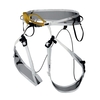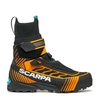Nepal to introduce new Everest climbing restrictions

 1 / 3
1 / 3 Simone Moro
Simone Moro
As The Guardian pointed out, the age restriction affects very few climbers as most fit within this age bracket, and therefore does little to tackle the very serious problem of overcrowding. The same holds true for disabled climbers, as they represent a tiny percentage of climbers and deaths. However, requiring mountaineers to have previous high altitude climbing experience before setting foot on Everest should ensure that they know the basics of mountaineering. Since the advent of commercial expeditions, the lure of Everest has been so strong as to attracted many novices, totally reliant on their guides to make it safely back down the mountain. It is this lack of skill that has often been citied as the major cause for so many deaths in the past.
In truth rules of this sort have often been discussed in the past, but enforcing them seems to be one of the government’s main difficulties. According to American magazine Outside, the largest Western commercial expeditions already require similar mountaineering experience, while most local guiding agencies do not require any previous climbing experience. These agencies, according to Outside, represent are a powerful lobby that the government will have to deal with. After a spate of high profile disasters - the 2013 brawl, the 2014 avalanche that killed 16 Sherpas in the Khumbu Icefall and the 2015 avalanche that killed 19 at Everest Base Camp - the government is now forced more than ever before to deal with the difficult question of improving safety on the slopes of the highest mountain in the world.
| www | |
| The Guardian | |
| Outside | |



 Copia link
Copia link
























